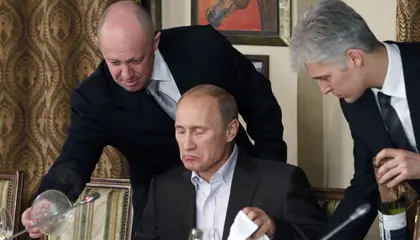Russian President Vladimir Putin has ruled for over 23 years and shows no signs of slowing down. Despite what is perceived as an unpopular war, in the West, recent data indicates that around 78 percent of Russians continue to back the 70-year-old leader despite massive troop losses in Ukraine.
At the start of the war in Ukraine, some Russia-watchers conjectured that Putin could be toppled by an oligarch due to economic losses from Western sanctions; or possibly by the military because of the losses they are suffering in Ukraine. However, time has shown that the oligarchs continue to rely on Putin's iron fist to maintain their business interests and the military is loyal to the despot.
- Find the newest Ukraine news pieces that came out today.
- Check the most up-to-date Ukraine news reports from today.
JOIN US ON TELEGRAM
Follow our coverage of the war on the @Kyivpost_official.
History, though, shows that sometimes leaders fall not because they have done something wrong in the eyes of their citizens, but simply because a young lion wishes to usurp the old lion king.
Recently, tensions between Wagner Group leader Yevgeny Prigozhin and Minister of Defense Sergei Shoigu have publicly boiled over, with Prigozhin openly lamenting the formal Russian military's poor organization, lack of supplies, and inability to accomplish strategic military goals in Ukraine.
In fact, Prigozhin's attacks on Shoigu rose to such a fevered pitch that the mercenary leader has complained that he is being blocked from receiving artillery shells by the Russian Ministry of Defense.
Prigozhin, a former street criminal, owes his fortune to Putin, but some speculate that he may recognize the changing winds in Russia as being his own window of opportunity to move up the ladder to the top spot.

Putin and Xi Praise Ties, Hours After Trump Sworn In
In a situation where Prigozhin would seek to topple his benefactor, he would likely need to execute several other steps in rapid succession.
For one, the ex-con would likely liquidate his opponents so as to prevent "counter revolutionary" activity. This would bode badly for the likes of Shoigu and Chechen leader Ramzan Kadyrov whose own militaries (public and private) could pose a formidable challenge to Prigozhin's ability to keep the crown.
Another factor would be that Prigozhin would need legitimacy. If he came to power without elections, and by totally overstepping the Russian Constitution, he would need some metric by which he could justify his seat on the throne.
Despite the West's widespread condemnation of Putin and calls to send him to The Hague, the official position of the White House remains that Washington does not seek or support "regime change" in Russia. The reasons are many, but among the most obvious is the uncertainty that a coup could provoke greater risks than those already produced by Putin's tenure - especially in terms of nuclear weapons.
The easiest way to achieve the backing of the West, would be to, paradoxically, create a large confusion as to who was in power in Moscow and to take advantage of the West's fears following the disappearance or death of Putin. Prigozhin would be wise to immediately take possession (or at least claim possession), of Russia's nuclear arsenal.
Having the nation's nukes in hand would allow Prigozhin to both fend-off any retrenched elements in the Russian military, forcing those who had not yet taken sides to come on board, while at the same time giving him a chip with which he could negotiate with the West.
The West, knowing that the old king was dead and that the new king was already in control of the nation's atomic capabilities, would likely be willing to trade recognizing the rebel as the new, de facto, leader of Russia, if he could guarantee that the stockpiles would remain secured.
The West might be bold and seek other guarantees - such as total withdrawal from Ukraine. As someone like Prigozhin is non-ideological, and driven by goals associated with personal enrichment, he would probably take the bait. His dream is to become king – not, like Putin, to change history.
Having disposed of Putin, the new leader would need to move quickly to prevent someone from pushing him from power – and so Western support would be key.
If a coup were to take place, it is hard to envision any potential coup-plotting candidate who would care more about Ukraine than about their own self-interests and nearly all of them would sacrifice Russia's territorial objectives, as outlined by Putin, in order to secure his own, personal benefit.
Considering these factors, and that Putin, even without a single soldier in Ukraine, is able to continue launching missiles on Ukrainian citizens for years into the future, meaning that the war could drag on for years more; perhaps it is time for Washington to consider backing those who wish to see the dictator's demise.
The views expressed in this opinion article are the author’s and not necessarily those of Kyiv Post.
You can also highlight the text and press Ctrl + Enter










